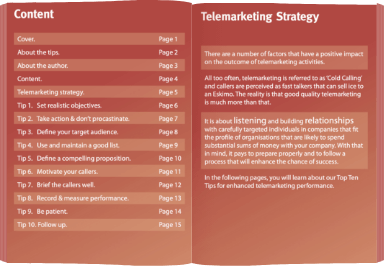We do a lot of new business development and telemarketing work with companies in the b2b sector. Most have excellent credentials and work for household name brands. That tells you something about their calibre and ability to deliver. Yet despite this, many still find it difficult to define what makes them different and why a prospective client should meet with them.
It has long been accepted that we have to define a good USP or point of differentiation. However, the reality is that we live in a commoditised world where little is truly new. Therefore, isn’t it essential that companies ‘engage’ with prospective clients rather than trotting out the same old information and credentials that other similar suppliers offer. Ultimately, it is hard for a prospective client to differentiate your service from another based solely on information in a brochure, a telephone call, website or directory listing. It may seem that you talk the talk (in your communications) but do you walk the walk?
Clearly, customer referrals are the most potent form of business lead generation and the best advertisement for your business. Hence, working on this area is crucial. Likewise, finding partners, champions and introducers that can refer you is essential. However, I’m not going to cover this here. I wanted to talk about the really key questions and the philosophy behind powerful lead generation. In other posts I have discussed proposition. However, here I’d like to dwell a while on what is going on in your prospects’ minds at the point of contact with your organisation where this contact is unsolicited.
I’m really talking about outbound marketing. The sad truth, especially in this tough climate, is that hardworking business people are under pressure and working harder than ever. Hence, at point of contact it is likely that they are stressed and under the cosh from:
-
-
- Their boss – to meet deadlines, cut costs, reduce headcount, meet targets.
- Their parent company – to report on market activity, deliver budget plans
- Stakeholders – to respond to unwanted media attention or risks to company business
- Shareholders – to deliver a positive ROI
- Staff – to offer more support, give more money or coach or train
- Family – for issues totally unrelated to work
-
This list isn’t exhaustive but it is illustrative of what might be on a prospective client’s desk or mind at the point that you contact them.
Therefore, isn’t it wise to think beyond your product or service and think more about them? At point of contact, they aren’t thinking about you or your business. They may however, have issues in the business that need resolving. They may need a personal boost. That’s why they are probably thinking:
-
-
- What’s in this for me
- Why should I see you?
- Why should I see you now as opposed to some undefined time way off into the distant future?
-
In fact, they you’d be lucky if they gave you time to even consider these things. That’s assuming your communication reaches them in the 1st place.
So what do we do? Well, our view is simple. It is about:
-
-
- Creating a reason to talk (now)
- Developing an opportunity for genuine dialogue (not a sales pitch)
- Finding common ground to start a conversation (two-way not one way)
- Thinking beyond your product or service and thinking more about their problems and opportunities.
- Getting in tune with their emotional, psychological and business needs
-
What do I mean by my last statement. Do I have to become a psycho-analyst? No. But you do need to recognise that within seconds of your contact, the prospect has probably already almost subconsciously and intuitively asked him/herself:
-
-
- Is this interesting?
- Do I like this person?
- Is it likely to help me do my job better?
- Will it be better than what I’ve already got?
- Is it going to improve our business?
- Do I have an issue or painful problem that this will resolve?
- Will it make me look good if I take this to my boss/the board etc?
-
If we think more about this side of the equation, we’re more likely to:
-
-
- Do an event (breakfast/lunch/intimate dinner) with expert speakers
- Conduct some research to share with prospective clients
- Make a call to ask opinion prior to feeding back research in the form of a white paper
- Start or engage in a social networking group in a specific interest area
- Engage with partners or influencers that serve the market you are targeting with a view to building value
- Forward a piece of interesting industry news to a prospect with a handwritten note
- Produce relevant communication that offers more than simply the services, features and benefits you have
-
I’m not saying the above are solutions or that they are foolproof. They are not. I’m not saying they will always work. They won’t. I’m not saying that these are the best solutions. Nothing beats client recommendations. What I am saying though is that we have to stop thinking from the start point of what we want to sell and start seeing it genuinely from the customers’ point of view. Start seeing new business as a long game not a short game. Start considering dialogue and rapport (the old way of working) and not pitching and presenting credentials.
Really, think about why people buy your services and find reasons to engage.
If you’d like to know more, or would like to attend a GSA new business workshop, please contact us on 0845 658 8192 or via our website.
Jonathan Silverman
GSA Business Development Ltd






